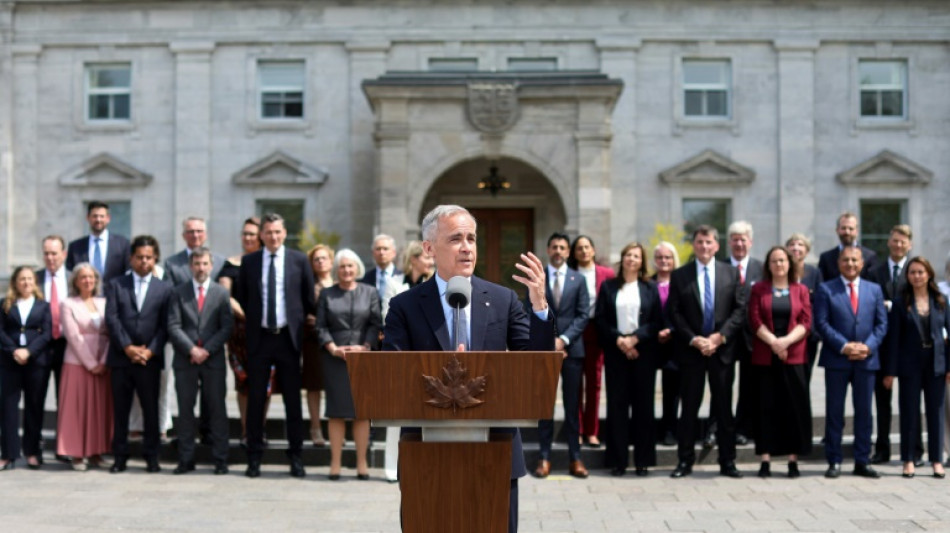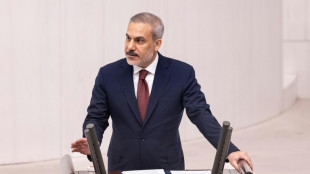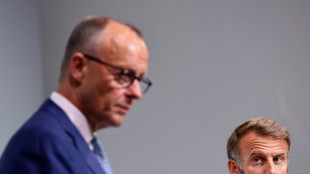

Carney says new govt will 'relentlessly' protect Canada sovereignty
Canada's new government will relentlessly protect the nation's sovereignty as it works to redefine fraught relations with the United States, Prime Minister Mark Carney said Tuesday as his cabinet was sworn in.
Carney's election win two weeks ago was largely defined by threats from President Donald Trump, whose trade war and repeated talk of annexing the United States' northern neighbor upended Canadian politics.
Carney, a former central banker with experience leading through major financial crises, convinced enough voters that he was the right choice to take on Trump, whose tariffs on imported autos and other goods have already cost Canadian jobs.
"Canadians elected this new government with a strong mandate to define a new economic and security relationship with the United States," Carney said in a statement before his new ministers took their oaths.
Addressing reporters after the ceremony, with a cabinet of Liberal Party loyalists assembled behind him, Carney said his "government will work relentlessly to keep Canada secure as a sovereign nation."
Trump discussed absorbing Canada into the United States on several occasions in his first Oval Office meeting with Carney last week.
The president insisted it would be a "wonderful marriage" if Canada agreed to his repeated calls to become the 51st US state.
Carney replied the Canada "won't be for sale, ever," and referenced the deep hostility among Canadians towards the prospect of a political union with the United States.
- 'Core mission' -
Carney's cabinet retains several key figures involved in negotiating with the Trump administration over tariffs, although some job titles have shifted.
Dominic LeBlanc, who has dealt directly with US Commerce Secretary Howard Lutnick in recent weeks, has been named the minister responsible for Canada-US trade.
Former foreign minister Melanie Joly has been moved to industry minister, with Anita Anand replacing her as Canada's top diplomat.
Finance Minister Francois-Philippe Champagne is keeping his post.
Since taking over from Justin Trudeau on March 14 as prime minister, Carney has tried to create distance from the previous Liberal regime, which became deeply unpopular over its decade in power.
His cabinet includes Trudeau allies, but also brings in new faces.
Evan Solomon, a prominent former journalist entering parliament for the first time, has been named minister for artificial intelligence, a new post nodding at Carney's pledge to transform Canada's economy.
Carney said his cabinet will be focused on a "core mission," which is "to create the strongest economy in the G7."
He promised to act fast on a middle class tax cut and remove inter-provincial trade barriers by Canada Day, on July 1, a move some economist believe could soften the impact of Trump's tariffs.
Carney had a lucrative career as an investment banker before serving as the governor of the Bank of Canada and Bank of England.
He is a political novice who will be new to parliament when the House of Commons reconvenes on May 27, opening with a throne speech by King Charles III, the head of state in Canada, a member of the British Commonwealth.
But Carney assured voters his experience in the private sector and as a central banker will help him rebuild Canada's economy, a message that resonated with voters.
Opinion polls showed the Liberals trailing the Conservatives by more than 20 points at the start of the year, but Carney's replacing Trudeau, combined with Trump's threats, sparked an unprecedented comeback.
The Liberals fell just short of the 172 seats needed for majority control of Parliament, but with 170 confirmed wins they will be in a strong position to pass legislation.
R.Barthelemy--PP





